Football Federation Australia CEO James Johnson opens up on promotion-relegation, transfers and the next step in XI Principles
FFA boss James Johnson has revealed his promotion-relegation model for Australian football, the importance of a transfer system and potential changes to the A-League import system as fans vote for “major overhaul” to the game. SEE THE SURVEY RESULTS
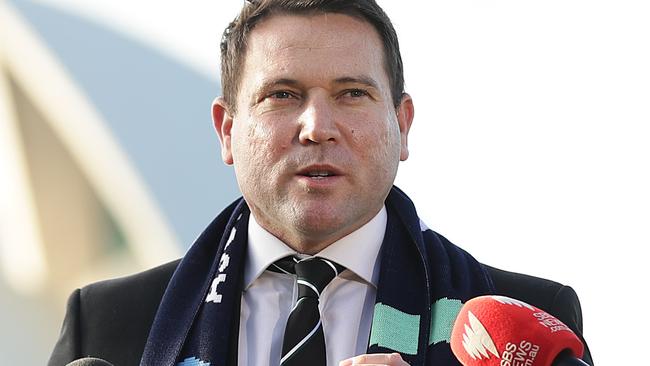
Football
Don't miss out on the headlines from Football. Followed categories will be added to My News.
A stunning 99 per cent of football fans believe the game needs a major overhaul in Australia, giving FFA boss James Johnson a mandate to carry out his bold vision – but alarmingly, nearly a third need serious convincing that this won’t be another disappointing anticlimax.
When Johnson revealed his blueprint for transforming the sport in this country two months ago, he was met with a healthy level of scepticism of the document’s unashamedly lofty goals.
And naturally, for fans who have been wooed – and then let down – by similarly optimistic plans in the past, the task of convincing the wider football community that this is not another false down is a tricky one.
Watch every match of the 2019/20 Hyundai A-League Finals LIVE on Kayo. New to Kayo? Get your 14-day free trial & start streaming instantly >
That message came through loud and clear this week when FFA officials sifted through the 3100 community responses to online surveys discussing the merits of the XI Principles.
Data obtained by News Corp revealed a stunning 99 per cent believe Australian football needs transformation, while 31 per cent of respondents believe “nothing ever happens” from these big-picture plans – and a third remain sceptical about what Australian football will look like in 15 years.
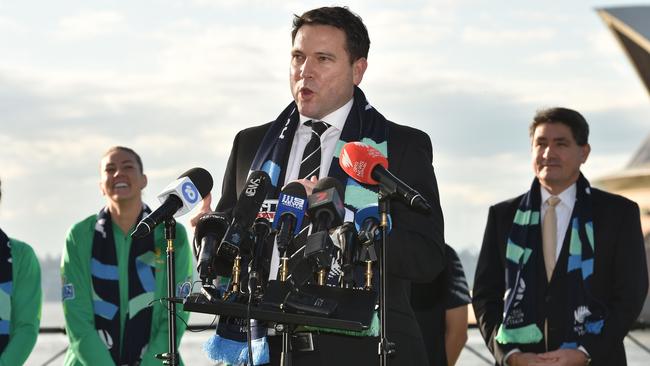
Far from being disillusioned by the figures, however, Johnson believes it is the hard proof he needs to know he’s got the backing of the public to make bold changes in the coming years – including a domestic transfer system, a long-awaited promotion-relegation system and A-League rule adjustments around foreign players, to encourage the growth of young Australian prospects.
Johnson has labelled the introduction of a game-changing transfer system as a top priority, and revealed what a second division competition could look like.
“I didn’t come back here just to administer the sport. What was interesting to me was really transforming it,” Johnson told News Corp.
“That’s important to me personally, otherwise I wouldn’t have come back from a top European club.
“Seeing that 99 per cent of the people who took part in the surveys believe football needs transformation, that for me gives me a lot of confidence that we’re on the right track.”
Part of Johnson’s aspirations include having the Socceroos become a top-15 team in the world, the Matildas becoming world or Olympic champions, and building the A-League into a top three league in Asia.
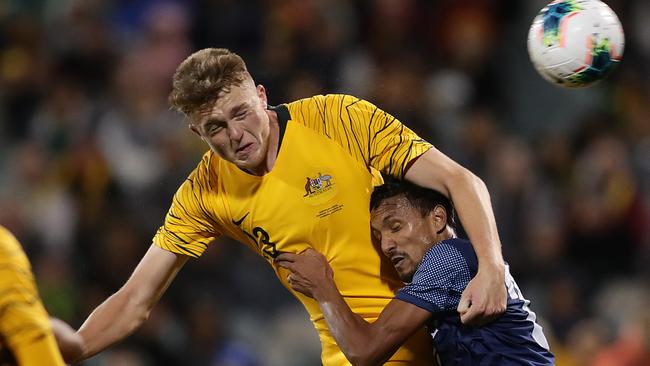
He understands why people are more than a little sceptical about how realistic his vision is.
“The only way (we can convince people) is by evidence,” he explains.
“I’m not surprised to see that statistic. I know these things, or similar things, have been done in the past.
“I’m not aware of any process that’s gone as broad or as deep in terms of engagement as this one.
“I think as we now steer the ship from the what and the why, to the who, how and when, which is already happening – that’s where we are at the moment – you’re going to see practical implementation of different measures that are in the XI Principles.”
Johnson points to the recent announcements, such as Trevor Morgan taking over as the National Technical Director, as evidence that the wheels are already in motion.
TRANSFER SYSTEM
The lack of a domestic transfer system has been a source of frustration for years, leading to one-year deals and a lack of job security for players and, for clubs, little reward for developing talent.
“There’s nothing stopping it. It’s just a prioritisation at the moment – but it’s one of the top agenda points,” Johnson says.
“I don’t see any real challenges with it. Because ultimately it is a system that works. It’s been tested.
“And it’s a system that allows the Australian game to hardwire itself into international football.
“So naturally you’ll see players contracted for longer periods and you’ll see more transfer fees coming into the sport. I think that’s a huge step forward.”
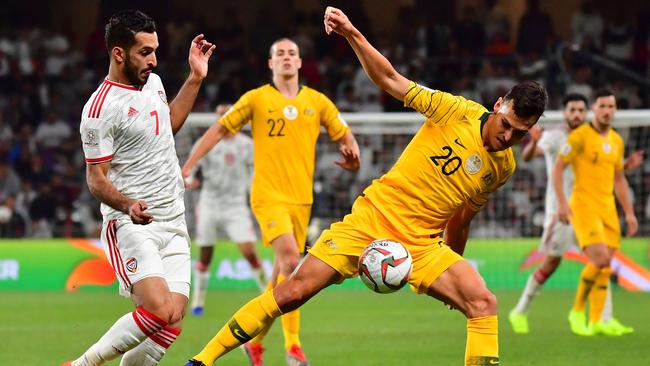
In the past week, Socceroos stars Trent Sainsbury and James Jeggo complete transfer deals in Europe, while Tom Rogic has a $7m Qatar move lined up – all of which would benefit Australian clubs, with a strong transfer market in place due to sell-on fees inserted in contracts.
“So when there is movement of players between European clubs, there’s usually a trickle-down effect between negotiated sell-on fees, training compensation or solidarity payments,” he said.
“I’m not so sure the clubs across the country, or FFA in the past, have actually understood these sorts of benefits.”
MORE A-LEAGUE NEWS
A-League 2020: Western United coach Mark Rudan concerned with VAR coming back for finals
A-League 2020: Perth Glory set up clash with Sydney FC after knocking out Wellington Phoenix
A-League 2020: Maclaren bags a double to seal Golden Boot and lift City to win over United
A-League 2020: Roar coach Warren Moon concerned return of VAR will slow flow of finals
Western United v Melbourne City: Powerful Mark Rudan speech inspiring unlikely A-League title run
YOUNG TALENT TIME
Johnson says changes to the A-League’s import rules – which currently allow for a maximum of five foreign players in a squad – will be considered as a means of ensuring Australia’s best young talent get enough gametime for their development.
Ninety per cent of those surveyed felt it was important to get more match minutes for young Australian players – which could result in a reduction of spots for foreign players, or incentives for playing Australians.
“I think this is a no-brainer. Maybe I’m surprised it’s not 100 per cent,” Johnson said.
“(Changing the import rules) is something we need to talk to the A-League about, and we’re going to present this evidence to the A-League owners.
“Whether we’re having discussions about reducing foreign player quotas, or about increasing homegrown players, the end result is the same.
“I think the A-League clubs will really take that in a positive way, because they’re ready to listen.”
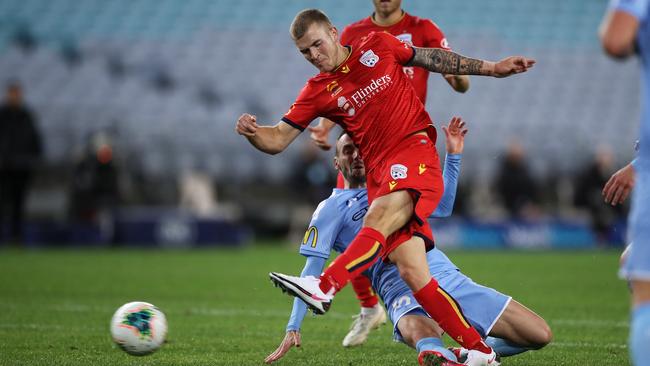
SECOND DIVISION
The merits of a promotion-relegation system is something which always fiercely debated in Australian football – with some suggesting it is the key to reshaping the game, while others note the financial burden on second-tier teams could be catastrophic for clubs.
Johnson believes Australia could model itself on the competition structure in Brazil, giving hope that a promotion system could be in Australia’s sights.
“Could there be a second-tier competition, with 10 or 12 teams that play 20-odd rounds home and away or do we look at a second-tier competition with conferences based in different states around the country that play half the season at state level and then end up playing at national level in a group stage, similar to how the Brazilian league operates,” he said.
“There’s two parts to the season that starts at state level, then a qualification process that goes into a national level of competition.
“This is something we could look at because someone of our challenges in Australia are similar to Brazil – where you have competition that are strong at state level and you have a very big country geographically, so their solution was to use this sort of format.”
Originally published as Football Federation Australia CEO James Johnson opens up on promotion-relegation, transfers and the next step in XI Principles
